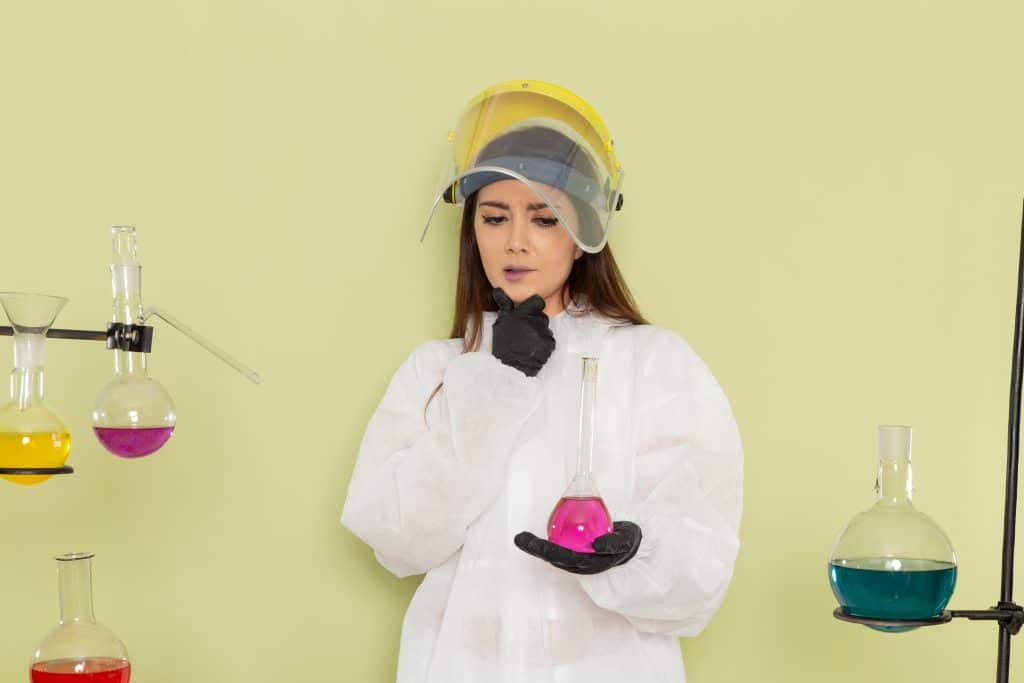The rise of synthetic biology in healthcare

The rise of synthetic biology in healthcare enables personalized treatments and innovative therapies. It addresses various medical challenges through engineered organisms and advanced technologies.
This field is revolutionizing how diseases are approached and treated. By leveraging synthetic biology, we are opening up new possibilities for medical advancements.
The rise of synthetic biology in healthcare is nothing short of revolutionary. Imagine a world where diseases are not just treated but prevented through engineered solutions.
This article dives into the exciting developments reshaping the future of medicine. It’s transforming healthcare into something more customized and efficient.
Understanding synthetic biology
When we talk about synthetic biology, we’re diving into an exciting field that mixes biology with engineering. This approach aims to redesign living systems for useful purposes, creating a new world of possibilities in science.
Synthetic biology involves constructing new biological parts, devices, and systems. It also includes re-engineering existing, natural biological systems, making it a broad and innovative field.
Applications of synthetic biology span various industries, particularly healthcare. It promises novel treatments and solutions for some of the world’s most pressing medical needs.
What is Synthetic Biology?
Synthetic biology involves constructing new biological parts, devices, and systems. It’s an emerging field that allows for the re-engineering of existing biological systems.
The applications in healthcare are profound, as synthetic biology can help create medications and therapies. This is making treatments more accessible and cost-effective.
New biological systems are created to perform tasks that were previously unimaginable. These innovations are revolutionizing medicine and enabling breakthroughs in treatment options.
Key Components of Synthetic Biology
- DNA Synthesis: Creating new, custom DNA sequences.
- Gene Editing: Modifying organisms by adding or altering genetic material.
- Metabolic Engineering: Reprogramming organisms to produce specific substances.
These components allow researchers to create organisms that can perform new functions. For instance, some engineered bacteria produce insulin more efficiently.
This innovation could lead to cheaper and more accessible medications for patients. With synthetic biology, treatment possibilities continue to expand and evolve.
Applications in precision medicine
Applications in precision medicine are changing how we approach healthcare. This innovative method tailors treatments based on individual characteristics, moving away from a one-size-fits-all approach.
Precision medicine considers factors like a person’s genetics, environment, and lifestyle. By analyzing these aspects, healthcare providers create more effective and personalized treatments.
This approach not only increases the chances of treatment success but also minimizes side effects. Customization is key to improving healthcare outcomes.
Understanding Precision Medicine
Precision medicine uses genetic, environmental, and lifestyle factors to tailor treatments. It is about creating targeted therapies for patients based on their specific needs.
This approach ensures better results with fewer side effects. By understanding individual characteristics, doctors can prescribe the best possible treatments.
The success of precision medicine is contingent on the development of new technologies like genomic sequencing. These advances are enabling more effective and customized therapies.
Key Applications
- Oncology: In cancer treatment, precision medicine allows for therapies tailored to the specific mutations in a tumor.
- Rare Diseases: Genetic testing helps in identifying rare diseases and provides pathways for targeted therapy.
- Cardiology: Patients with heart conditions benefit from personalized treatment plans that address their unique risks.
Precision medicine makes it possible to design drugs based on specific biomarkers. This reduces trial and error in prescribing medications.
The role of synthetic biology in precision medicine is pivotal, as it helps craft these personalized therapies. This breakthrough improves the effectiveness of treatments.
Ethical considerations in synthetic biology

When discussing ethical considerations in synthetic biology, it’s important to recognize the potential and risks involved.
As this field grows, questions about its impact on society, the environment, and individual rights emerge.
One of the core concerns is the safety of engineered organisms. Are they safe to release into the environment? This raises fears about unintended consequences.
Genetic modifications, particularly in humans, also raise questions about consent, especially for future generations. Ethical debates continue to shape how synthetic biology evolves.
Key Ethical Questions
One of the core concerns is the safety of engineered organisms. Are they safe to release into the environment?
There are fears about unintended consequences that could arise. Another issue involves genetic modifications in humans.
Modifying genes raises questions about consent, especially for future generations.
Benefits vs. Risks
While the benefits of synthetic biology are vast, such as creating new therapies or sustainable solutions, the risks must also be weighed. Here are some considerations:
- Environmental Impact: How will engineered organisms affect natural ecosystems?
- Equity and Access: Will these technologies be available to everyone, or only to those who can afford them?
- Genetic Privacy: How do we protect individuals’ genetic information from misuse?
While synthetic biology offers immense benefits, such as creating new therapies, the risks must also be considered. Public perception plays a significant role in shaping policies.
Transparency in research and development is crucial for societal trust. Ethical oversight is necessary to ensure responsible research practices in synthetic biology.
Future trends in healthcare innovation
Future trends in healthcare innovation present exciting possibilities. As we leverage advancements in technology and science, the healthcare landscape is set to transform dramatically.
Artificial intelligence (AI) and machine learning are becoming essential tools in healthcare. These technologies can analyze vast amounts of data to identify patterns, predict outcomes, and enhance decision-making.
The rise of telehealth is another game-changing trend. Virtual visits enable patients to consult healthcare providers from the comfort of their homes, making healthcare more accessible.
Integration of AI and Machine Learning
AI and machine learning are playing a growing role in healthcare. They help analyze large datasets to detect diseases early, improve diagnostics, and enhance treatment planning.
By analyzing medical imaging and patient data, AI tools can identify health issues that may be missed by humans. This improves both the accuracy and efficiency of healthcare services.
The integration of these technologies continues to evolve, shaping how doctors make decisions. AI and machine learning enhance overall patient care and medical outcomes.
Telehealth Expansion
Telehealth services are expanding rapidly, making healthcare more accessible. Virtual consultations allow patients to receive care without leaving home.
This trend is particularly beneficial for individuals in remote areas or those with limited mobility. Telehealth reduces the need for travel and provides greater convenience for patients.
As telehealth services continue to grow, they will likely become an integral part of the healthcare system. Virtual care has the potential to revolutionize healthcare delivery.
Personalized Medicine and Genomics
The push towards personalized medicine continues to grow, driven by advancements in genomics. Treatments can be tailored based on an individual’s genetic makeup, improving their effectiveness.
This shift allows for more efficient therapies with fewer side effects. Personalized medicine ensures that treatments are best suited to the patient’s genetic profile.
As genomics technology evolves, more healthcare providers will offer personalized treatments. The potential for better patient outcomes increases as these technologies continue to advance.
Wearable Technology
- Health Monitoring: Devices like smartwatches can track vital signs and alert users to potential health issues.
- Data Collection: Continuous data collection through wearables helps provide comprehensive health insights.
- Patient Engagement: Wearable tech can motivate individuals to adopt healthier lifestyles.
As we look to the future, the healthcare sector is poised for further advancements. The integration of new technologies will likely enhance the quality of care and improve patient outcomes.
The collaboration between technology and healthcare professionals will be crucial in driving these innovations.
Challenges facing synthetic biology

The field of synthetic biology is progressing rapidly, but it faces several challenges that can impact its growth and acceptance.
Understanding these challenges is crucial for innovators, scientists, and the public to navigate the future responsibly.
Regulatory hurdles remain a major challenge. The lack of consistent regulations across countries can limit research and international collaboration.
Ethical concerns also persist, particularly around genetic modifications and the safety of engineered organisms. These questions need careful consideration as synthetic biology advances.
Regulatory Hurdles
One significant challenge is the lack of consistent regulations across countries. Different rules on genetically modified organisms (GMOs) complicate research and development efforts.
Inconsistent regulations can delay the approval and release of synthetic biology innovations. This limits the ability to share findings and collaborate internationally.
Uniform regulations are essential for advancing synthetic biology. Global collaboration is needed to ensure consistent safety standards.
Ethical Concerns
Ethical questions are prominent in synthetic biology. As technology advances, there is potential to modify life forms in ways that raise societal concerns.
Modifying human genes, for example, has led to debates about what is acceptable in science. Society must consider where to draw the line regarding genetic engineering.
Public perception is key in determining the path synthetic biology takes. Society must balance innovation with ethical responsibility to ensure beneficial outcomes.
Public Perception
Public acceptance of synthetic biology plays a crucial role in its advancement. Many people are skeptical or fearful of genetically engineered organisms.
Educational efforts are needed to help the public understand the benefits and risks. Transparent communication is essential to building trust in synthetic biology.
Public perception can shape the future of synthetic biology. Open discussions will help foster understanding and acceptance of this technology.
Technical Challenges
- Precision and Reliability: Ensuring that synthetic systems work as intended without causing harm.
- Cost of Development: Developing synthetic biology solutions can be expensive, limiting access for smaller companies.
- Data Management: Handling large amounts of genetic data poses significant challenges in both storage and analysis.
Despite these obstacles, the potential benefits of synthetic biology are immense. Ongoing research aims to address these challenges and pave the way for innovative solutions.
Collaborations among scientists, policymakers, and the public are essential to ensure that synthetic biology develops responsibly and ethically.
FAQ – Frequently Asked Questions about Synthetic Biology
What is synthetic biology?
Synthetic biology is a field that combines biology and engineering to redesign organisms for useful purposes, such as creating new medicines or sustainable materials.
What are the potential benefits of synthetic biology?
The benefits include developing personalized medicine, creating sustainable agricultural practices, and addressing environmental challenges through engineered organisms.
What ethical concerns are associated with synthetic biology?
Ethical concerns include the potential for unintended consequences, issues of consent, and the implications of genetic modifications in humans and the environment.
How can we ensure the responsible development of synthetic biology?
Responsible development can be ensured through collaboration among scientists, policymakers, and the public, as well as establishing clear regulations and ethical guidelines.





